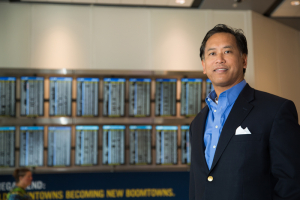Ben Amaba isn’t from the city of Houston, and he isn’t an alumnus of the University of Houston. But as an industrial engineering guru, Amaba said he now finds himself inextricably tied to both Houston and its University.
“There is so much opportunity in Houston for industrial engineers, and the University of Houston is a big part of that,” Amaba said. “That’s why I’m here, and that’s why I’m such a big supporter of the University of Houston and its industrial engineering programs.”
Amaba is the newest member of the UH Cullen College of Engineering’s Industry Advisory Board for the Industrial Engineering Department. As a worldwide executive for IBM, Amaba spends his days eating, sleeping and breathing industrial engineering processes for optimizing the performance of systems and integrating humans, machines, materials and information.
Tech, Amaba said, is the next great frontier for industrial engineers to tap into, and Houston is the best city in the world to do it in.
Learn more about Ben Amaba, IE at IBM, and the future of the IE field in our Q&A below!
Q: You gave the Cullen College’s Industrial Engineering Department the gift of a scholarship for students pursuing a Professional Engineering (P.E.) license. What motivated you to provide this scholarship?
A: I think it’s very important for engineers to aspire toward that level of professionalism because, as an engineer, you’re responsible for public health, safety, security and environmental protection. I gave the scholarship to increase awareness of the Professional Engineering license amongst students and to remove the economic constraints of pursuing it. I believe it’s very important for established industry professionals to mentor young engineers and help them get to the professional level.
Q: What are industrial engineers responsible for at IBM and how do they contribute to the company?
A: Industrial engineers contribute to the company in a myriad of ways because they can apply their skillsets across the company. The five major cross-disciplinary areas that industrial engineers work in at IBM are systems analysis and design, facilities, logistics, quality, and human factors and ergonomics.
Q: What career advice can you share with industrial engineering students and recent graduates?
A: First of all, target and brand yourself as a professional by pursuing a PE license. Secondly, collaborate in public and private partnerships, like industry consortiums, to figure out where you want to go and where the industry is going. And, thirdly, find mentors that you can turn to for advice on your career path. Much like a corporation benefits from a board of directors, you can benefit from the feedback of trusted advisors.
Q: What do you see as the future of industrial engineering?
A: Since industrial engineers are not constrained by industry, geography or domain, the possibilities are almost endless. Because industrial engineers can apply their skill sets to so many avenues, from a hospital, to a theme park like Disney, to a software factory, I don’t think you can put borders on the discipline right now. I think the future is wide open.
